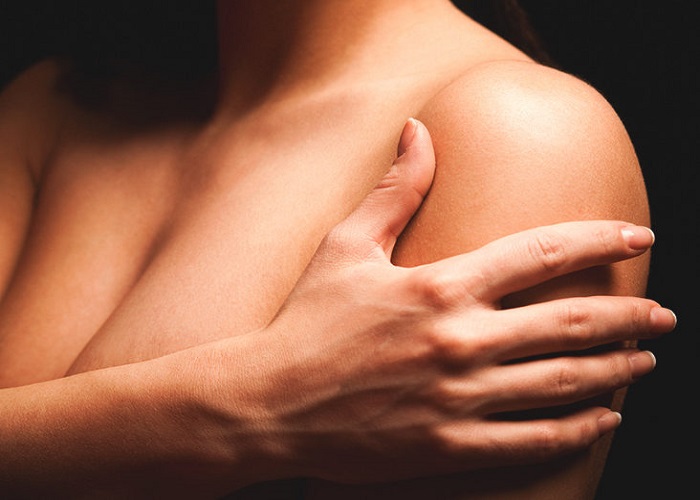The breasts go through many changes. They grow and develop during puberty. In adulthood, they are influenced by female hormones, such as estrogens and even progesterone.
Sometimes the nipple can become more sensitive and inflamed. At this time, you should consider going to a gynecological consultation. Inflammation or changes in their sensitivity can occur for multiple causes and be the warning of an infectious process or the symptom of a disease. Therefore, we recommend that you continue reading this article by FastlyHealabout the causes and treatment of an inflamed nipple.
Table of Contents
Swollen nipple: causes
Many causes can give rise to nipple inflammation, including:
- External or environmental factors: the environment in which one lives, the clothes used, or the activities carried out daily can alter the sensitivity of the breast and cause inflammation of the nipple. Powerful blows, trauma, or friction in the area of the nipple can trigger swelling in it.
- Allergy: the nipples are one of the body’s most sensitive areas. Therefore, they can be easily irritated when in contact with an allergen or another type of external irritant agent.
- Infectious processes: fungal (candidiasis) or bacterial infections in the breast area can cause pain and inflammation in the nipple.
- Hormonal changes: The hormonal changes that women usually undergo during puberty, the reproductive stage, and menstrual cycles can trigger nipple inflammation.
- Taking some medications: hormonal medications, such as birth control pills, can classify breast sensitivity, especially the nipple, due to the number of estrogens and progesterone in birth control pills, or even the hormones prescribed during menopause.
- Benign tumors: there are many cases where, in addition to increased sensitivity in the nipple, inflammation of the same may occur due to a sebaceous cyst or a benign tumor.
- Hypothyroidism: the malfunction of the thyroid gland due to a deficiency of thyroid hormone causes the appearance of some of these symptoms, such as inflammation, as well as an increase in the sensitivity of the nipple, accompanied by redness in the area.
- Ductal ectasia or mastitis: this is what is known as obstruction of the milk ducts, which are the ducts through which breast milk circulates. Mastitis is very common during breastfeeding causes increased sensitivity in the nipples and pain.
- Paget’s disease: This disease affects the nipples. It is characterized by itching and inflammation of the nipples. It is a type of skin cancer that a dermatologist must examine.
Inflammation of the nipple: associated symptoms
The inflammation of the nipple can be accompanied by a series of symptoms that can help make an accurate medical diagnosis. These symptoms include:
- Increase the size of the nipple and the breast in general and the axillary nodes.
- Nipple pain that may encompass the breast.
- Itch.
- Fever.
- Discharge from the nipple
- Color change and swelling are accompanied by heat.
Diagnosis of nipple inflammation
As soon as symptoms appear, a doctor should be consulted. The gynecologist or hematologist is the doctor trained to diagnose the cause of the inflammation in the nipple accurately.
According to the patient’s symptoms, the specialist will request the necessary studies to reach the diagnosis before a physical examination of the breast and nipple. The medical tests that may be required are:
- Mammogram.
- Ultrasound.
- Nuclear magnetic resonance.
Swollen nipple: medical treatment
- Suppose it is an infection that causes inflammation of the nipple. In that case, it is necessary to start treatment with antibiotics to eliminate the bacteria or fungus causing the disease and other symptoms that accompany this alteration.
- Pain relievers and anti-inflammatories will alleviate the symptoms of nipple inflammation, whether taken orally or applied directly to the nipple using creams or ointments.
- If it is an allergy, an antihistamine is indicated to relieve inflammation and other symptoms that accompany this alteration.
- If it is a hormonal disorder, the doses of hormones consumed during menopause should be reduced, and this would help to reduce the sensitivity and inflammation of the nipple. If it persists, the treatment can be eliminated if your treating doctor indicates it. This should also be done if the consumption of birth control pills causes inflammation.
Other tips for treating a swollen nipple
- It is necessary to wash the nipples with sterile water two times a day without soap.
- It would be best if you kept the nipples hydrated. This will prevent increased sensitivity, pain, and irritation.
- Wear loose-fitting cotton bras that keep your breast dry and moisture-free.
The inflamed nipple can be the product of multiple causes, so its diagnosis and treatment must be carried out by the hand of specialist doctors to control the symptoms.
This article is merely informative. At FastlyHeal .com, we do not have the power to prescribe medical treatments or make any diagnosis. We invite you to see a doctor in the case of presenting any condition or discomfort.
If you want to read more articles similar to Swollen nipple: causes and treatment, we recommend that you enter our category of Female reproductive system.

I am a Surgeon with a diploma in comprehensive ultrasound and surgical care residency, an area I am specializing in. During the exercise of my profession, I have realized the need for patients to know the diseases they suffer, and I can tell you that a large part of their complications is due to a lack of information. Being a health web writer allows me to transmit my experience, without borders, to all those readers eager for knowledge, educate them in the prevention of diseases and promote a healthy lifestyle.

